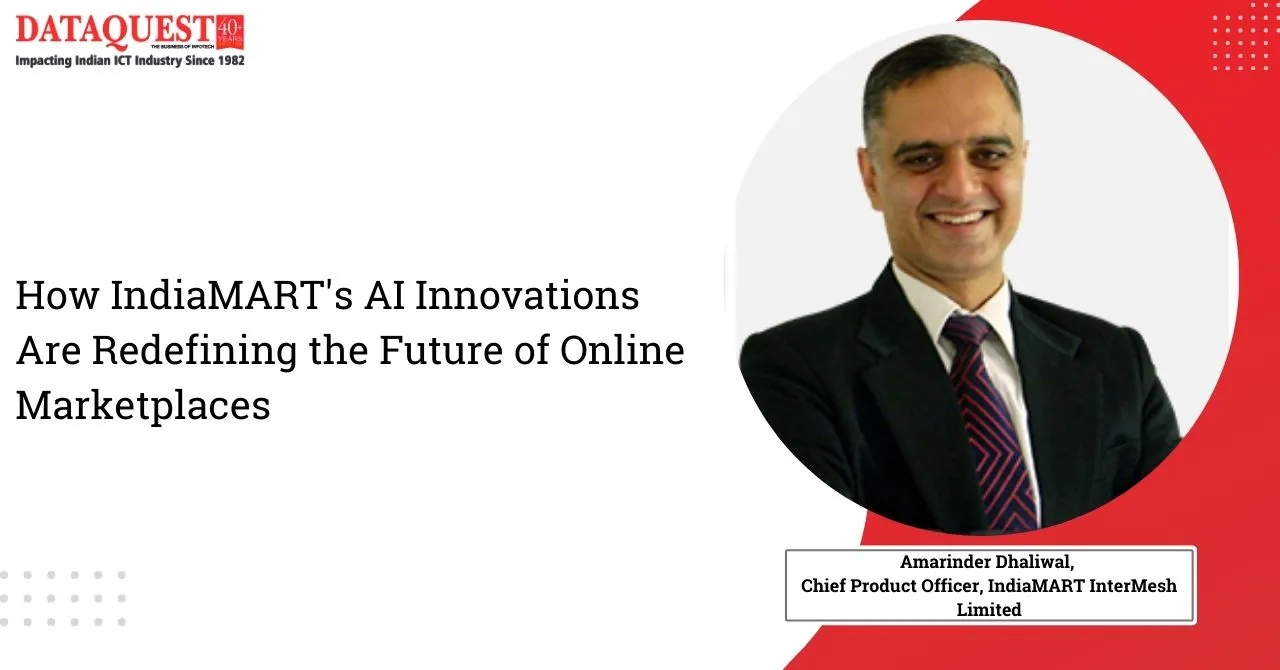In this interview with Amarinder Dhaliwal, CPO of IndiaMART InterMesh Limited, we explore how they are using AI to transform B2B e-commerce at IndiaMART. Discover their advanced AI-driven solutions, all while maintaining data privacy and quality.

Artificial Intelligence has now turned out to be the game-changer in every element associated with the rapidly changing digital landscape. In this regard, one of the most profound transformations of all time is taking place in online marketplaces.
In an exclusive interview with Amarinder Dhaliwal, Chief Product Officer, IndiaMART InterMesh Limited, we delve into how AI is reshaping the company’s operations. He oversees both product and technology at IndiaMART. From improving product classification and catalog management to optimizing matchmaking between buyers and suppliers, AI plays a pivotal role in IndiaMART’s strategy. Excepts from an interview:
AI is playing a big role these days, Can you share a successful AI project you’ve led?
Data is truly the backbone of everything we do at IndiaMART. We’ve been leveraging machine learning for the past seven or eight years, and more recently, AI, across various projects.
The company’s innovative AI-powered solutions have significantly enhanced user experience and operational efficiency. One such example is the Lead Manager, a CRM platform that utilizes AI-driven suggested replies to streamline communication between buyers and sellers.
Over 60% of messages on the platform are now sent using these suggested replies, demonstrating the platform’s effectiveness in reducing response times and improving overall communication.
With a massive user base of 198 million registered buyers and 8 million suppliers offering 110 million products across 56 industries, our AI innovations are poised to have a far-reaching impact on the B2B landscape. This article delves into the company’s AI-powered solutions and explores how they are reshaping the future of online marketplaces.
It’s difficult to pick just one, but here’s a general overview:
Search and User Experience: AI helps us understand user intent behind searches, even if they’re in different languages, misspelled, or combine terms. This allows for accurate categorization of user requirements and better matchmaking.
Matchmaking: AI helps us identify the most suitable suppliers likely to fulfill a buyer’s specific needs.
Communication Platform: We have a platform called Lead Manager where suppliers and buyers interact. AI suggests actions to both parties, facilitating faster communication.
Catalog Quality Enhancement: AI helps with image cropping, background cleaning, and even extracting information from product images and text descriptions. This ensures accurate product categorization and improves search results.
Content Quality: While we don’t use AI for content generation (as ours is a user-generated platform), AI helps improve the quality of uploaded content by identifying specifications and ensuring proper categorization.
Can you elaborate on how AI is used to automate and improve catalog management, specifically regarding product classification, image tagging, and content generation?
Our primary focus is on improving the quality of the data, not automation. Here’s how AI helps:
Image Processing: AI helps clean and enhance uploaded product images.
Product Tagging: Unlike a platform with a limited range of products, IndiaMART deals with hundreds of categories. AI helps with tagging products based on crucial specifications and brand information.
Content Categorization: AI analyzes product descriptions to identify the most relevant category for each product, ensuring accurate search results and matchmaking.
How do you leverage AI for personalized user experiences?
We don’t use specific AI techniques for personalization. Instead, we rely on various models within Lead Manager.
For instance, when a buyer inquires about a mattress, AI suggests relevant follow-up questions a supplier might ask, like size or material preference. These suggestions are tailored based on the specific product category, making communication between buyers and suppliers more efficient.
Can you describe the AI algorithms used for buyer-seller matching?
We employ a combination of open-source and API-based models, including tools like LLaMA and ChatGPT. These models are used to analyze and match buyer requirements with supplier offerings, continuously optimizing the matchmaking process based on real-time data.
What challenges did IndiaMART face regarding data quality and quantity when developing AI-powered features?
The accuracy of any AI output hinges on the quality of the data fed into the system. Since IndiaMART is a user-generated platform with millions of suppliers, cleaning and ensuring data consistency is crucial.
For instance, during product categorization, we encountered inconsistencies where commercial machines were categorized as regular machines, or mattress sizes were mixed up. Cleaning this data before using it to train models was a significant challenge.
How do you optimize AI models to handle large data volumes and real-time interactions?
With advancements in Generative AI, optimizing models has become more manageable. The cost of processing tokens has decreased, and model performance has improved. We focus on refining prompts and leveraging efficient algorithms to handle large datasets and real-time interactions effectively.
Can you share IndiaMART’s product roadmap for the next few years? How does AI play into these plans?
As mentioned earlier, AI is central to our business model. We believe that by continuously improving the quality and quantity of data fed into our AI models, we can significantly enhance our matchmaking capabilities.
Our roadmap includes enhancing our AI capabilities to improve content quality, matchmaking accuracy, and search functionality. We aim to better understand user requirements across different languages and dialects, thereby improving the overall user experience and operational efficiency.
How do you ensure the privacy and security of user data, and what measures are taken to prevent algorithmic bias?
We prioritize data privacy by using aggregated data rather than personalized information. To prevent algorithmic bias, we focus on cleaning and standardizing data to ensure that the AI models are trained on accurate and unbiased inputs.
Online Coverage: DATAQUEST

